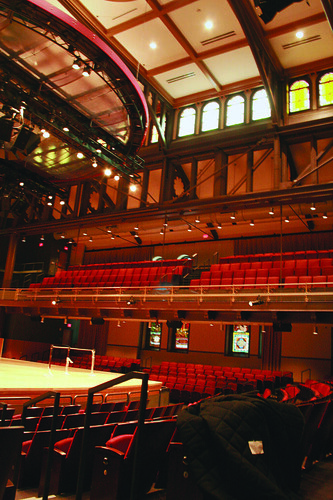The Baptist Temple, established in 1891, will reopen with renovations that combine past and present on April 14 and serve as a campus event hall.
With a Romanesque façade and modernized interior, the Baptist Temple has a new look that blends past and present, as the North Broad Street mainstay prepares to reopen April 14.

“When you come into the building, you come into a building that has both elements of its past and its future,” Baptist Temple Executive Director Charles Bethea said.
From its stone chapel-like exterior to its 140 multicolored stained-glass windows, it seems not much has changed about the Baptist Temple since Temple founder Russell Conwell established it in 1891. However, inside, new life has come to the 36,000-square-foot building.
Inside, visitors will be greeted in the main hallway by a large staircase with glass sidewalls and a backdrop of the former church’s stained glass windows. Other spaces lingering of the past include Lewis Klein Hall, a 1200-seat circular performance area through which a projection-like reflection of the temple’s stained-glass windows appears on a glass pane separating the balcony area from the performance space. The Chapel of Four Chaplains, which was dedicated by former President Harry Truman to commemorate fallen soldiers and set to serve as an intimate gathering space for smaller events, retains its original appearance, adding only a bit of modernity with clear lacquer on its stone floor and modern light fixtures.
The renovated space will serve as a performance, event and activity area for both members of the university and the outside community.
“Our goal is to make it as accessible as is reasonable and practical for university events and to attract audiences from the community as well as from the university and … find a place in the larger Philadelphia community,” Bethea said. “We’ll be open to … all potential users to make it a … center of vitality and activity right here on the campus.”
The new performance and event space originally served as both a pulpit for Conwell’s ministry and a gathering place for the community. It was not until the early 1970s when the church left that the university gained ownership of the temple. At this time, it began using it for various events. But after years of use, the temple closed because it was becoming “harder to maintain and use,” Bethea said.
After much discussion about whether the temple should be preserved or destroyed, the final verdict came when the Philadelphia Historical Commission deemed it a historical site in 2003, forcing the university to not only maintain the building but also to maintain its historical appearance.
“Ultimately the idea of creating an events center for Temple University seemed like the best use of it, to both preserve it … for what it had been in the past and take it on into the future,” Bethea said.
With the university’s 20/20 vision – a plan calling for renovations throughout Main Campus – in motion, as well as involvement and engagement with the surrounding community that will include a library on North Broad Street and $30 million in funding from the state and fundraising efforts, the university began renovating the temple two years ago under the direction of RMJM Hiller architectural firm’s Kenneth Jacobs.
One of the challenges in renovating the building, which helped maintain its historical integrity, was the list of specifications required for maintaining a historical structure. As a result, changes to its exterior were almost impossible. An exception was made that allowed contractors to add an accessible side entrance, Bethea said.
While structural constraints were a challenge, a lot went into planning the temple’s premiere events. Variety and versatility figured highly in selecting the commencing performances for the temple, Bethea said.
Award-winning Broadway performer Patti LuPone will be the first to perform at the venue April 17. Upcoming performances also include Philadelphia musical organization the Mendelssohn Club April 24 and Temple University Choirs April 28.
“We thought [the first performances] were a good way to show that we really are a flexible and versatile [space],” Bethea said.
Bethea also said the temple is looking for lecturers to come speak in the fall. In its heyday, guest speakers included Franklin Roosevelt and Hellen Keller. Additionally, a student-planned and -executed day of events is slated for April 30. As of now, there will be musical and dance performances, fashion shows and visual art displayed from 10 a.m. to 5 p.m. During the evening a more formal event, Temple After Dark, will include a disc jockey and two student performances.
“[The event is] gonna say something about our student body,” Baptist Temple student intern and senior printmaking major Scott Holford said.
The Baptist Temple’s ribbon-cutting ceremony is set for April 14 with Mayor Nutter scheduled to appear, along with members of the Temple community and surrounding area.
Shari DaCosta can be reached at shari.dacosta@temple.edu.



Be the first to comment